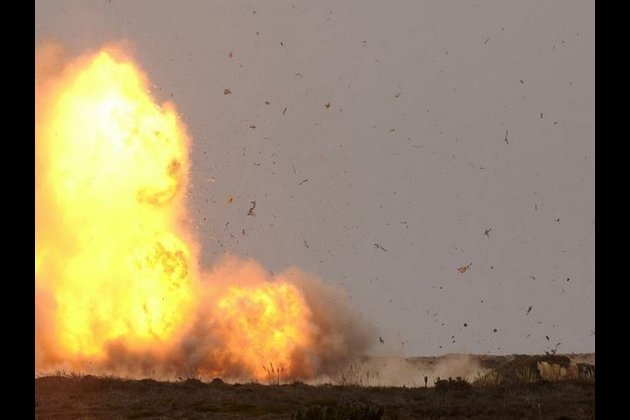
At least three Nigerian soldiers, including an army commander, were killed on Monday when their truck was struck by an improvised explosive device planted by Boko Haram militants, military sources told AFP according to thedefensepost.com.
The military vehicle hit the mine while patrolling in a three-vehicle convoy in Damboa area of Borno state, two military sources said.
Damboa town, the headquarters of the Local Government Area, is around 85 km (53 miles) southwest of Borno state capital Maiduguri.
“The 145 Task Force Battalion lost its commanding officer, a lieutenant colonel, and two soldiers after their vehicles stepped on an IED buried by Boko Haram terrorists,” one military officer said.
“Four soldiers sustained serious injuries,” said a second officer, adding that they were evacuated by air to Maiduguri for medical care, he said.
Both officers did not want to be named as they had not been authorized to speak to the media.
“Two gun trucks and a Tata truck” were damaged in the explosion which occurred at around 9:30 a.m. north of Damboa, between Mauli and Borgozo, Premium Times reported. Reinforcements were sent to the area from Beni Sheikh.
The Nigerian military has been operating in the wider area in recent days. Colonel Sagir Musa on Sunday said that 117 Task Force Battalion and the Civilian Joint Task Force militia cleared Mboa, Mboa-Kura, Yarchida, Bombula, Tshata and Bamzir villages, near Chibok, around 30 km south of Damboa town.
It is unclear which faction of Boko Haram was responsible for the attack, although the one led by Abubakar Shekau more-frequently uses roadside bombs.
However, fighters from the Islamic State West Africa Province faction of Boko Haram attacked a Nigeria military base in Sabon Gari near Biu, around 50 km southwest of Damboa on April 26. ISIS claimed 10 soldiers were killed and another captured. Three days later, security sources told AFP at least five soldiers were killed and around 30 were missing.
The jihadist group known as Boko Haram began its decade-long bloody insurgency in northeastern Nigeria in 2009 but it has since spread into neighboring Niger, Chad and Cameroon, prompting a regional military response.
Boko Haram split into two factions in mid-2016. One, led by long-time leader Abubakar Shekau, is notorious for suicide bombings and indiscriminate killings of civilians. Shekau pledged allegiance to ISIS leader Abu Bakr Al-Baghdadi in March 2015, but ISIS central only gives formal backing to the other faction, which it calls Islamic State West Africa Province.
The ISWAP faction, which largely focuses on attacking military and government targets, was led by Abu Mus’ab Al-Barnawi, but in March, audio recordings revealed that ISIS appointed Abu Abdullah Idris bin Umar, also known as Ibn Umar al-Barnawi, as leader. ISIS has not yet made a public statement confirming the change.
More than 27,000 people have been killed and two million others displaced, sparking a dire humanitarian crisis in the region. On April 30, the U.S. Ambassador-at-Large and Coordinator for Counterterrorism Nathan A. Sales said that the U.S. assesses that Boko Haram and ISWAP “have been responsible for over 35,000 deaths since 2011.”


